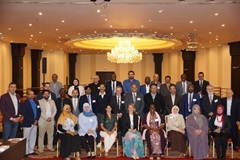Capacity building workshop of a pool of experts to support countries develop National Immunization Strategy (NIS) using the Eastern Mediterranean Region NIS toolkit within the context of COVID-19 recovery – Amman, Jordan, 8-11 May 2023

Participants:
Twenty-eight participants representing the World Health Organization (WHO), United Nations International Children’s Emergency Fund (UNICEF), Ministries of Health (MoH) and a Freelance consultant
Purpose:
The workshop objectives were to brief participants on the Immunization Agenda 2030, Gavi 5.0/5.1 global immunization roadmap, especially around zero dose children andmissed opportunities for vaccination, immunization in humanitarian emergencies, NIS development guide, the EMR NIS toolkit and NIS costing tool.
Details:
Although EMR countries are at different levels of implementation of their immunization strategic plans, the COVID-19 pandemic derailed the hypotheses on which most existing plans were developed. Some countries in the Region expressed interest to develop National Immunization Strategic Plans with the help of a consultant who is fluent in Arabic. Such are not easy to find, hence a workshop to build the capacity of a pool of consultants selected within the region to support EMR countries develop NIS was held in Amman, Jordan from 8 to 11 May 2023.
Facilitators drawn from Gavi, UNICEF and WHO made technical presentations in line with the purpose of the workshop virtually and on-site. Participants used the EMR NIS toolkit with data from Jordan, Pakistan, Syria, and Yemen for three group work sessions: 1) conduct of situational analysis, 2) develop a strategy framework, 3) develop a Monitoring and evaluation framework. The fourth group work was on the NIS. Cost. Each of the group work was followed by debriefing in plenary.
A post workshop evaluation shows that >90% of participants found the training helpful, met their expectations and were confident enough to support a country develop an NIS.
Moving forward, the Eastern Mediterranean Regional Office of WHO and UNICEF’s Middle East and North Africa Regional Office will institute monthly calls to coordinate all aspects of NIS development in the region, create a network with the trained pool of experts for continuous learning opportunities and create a system of coaching and backstopping of consultants.
---
Authors: Sume Gerald Etapelong, Elfakki Eltayeb, Hasan Quamrul, WHO EMRO
